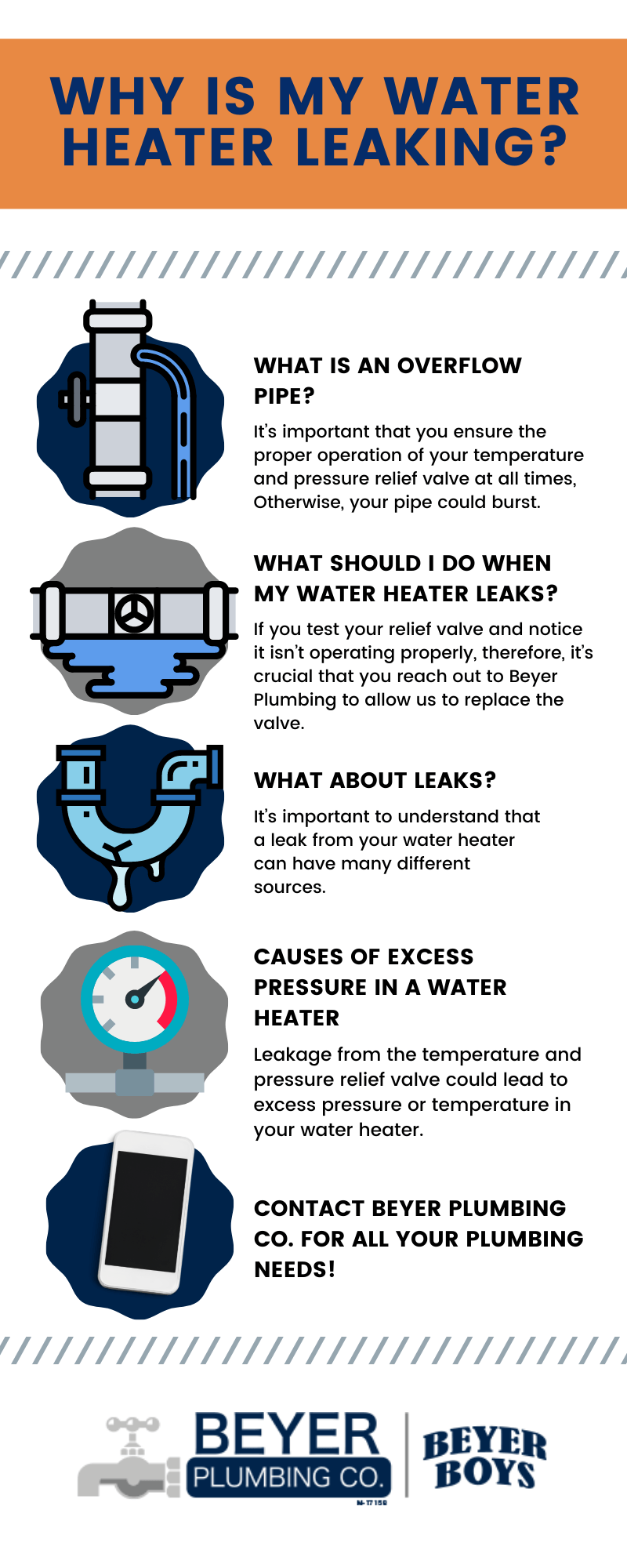A leak from a water heater can be a source of major concern. In addition to causing water damage in the area around the water heater, a water leak typically indicates a more serious problem with your San Antonio water heater. Leaks should be addressed immediately. In some cases, you may notice a leak coming from what looks like an overflow pipe attached to your water heater.
Since the condensate overflow pipe for air conditioners looks similar, the vertical pipe on water heaters is often confused for an overflow pipe. However, this pipe is actually what’s known as a temperature and pressure relief valve drain pipe. Keep reading to learn more about water heater leaks and what to do specifically if you notice a leak coming from the pipe attached to this valve.
What Is an Overflow Pipe
A temperature and pressure relief valve does just what its name suggests: relieves temperature and pressure from a water heater. If the internal pressure in your hot water heater reaches or exceeds 150 pounds per square inch, or if the temperature of the water exceeds 210 degrees Fahrenheit, the temperature and pressure relief valve will open.
When it opens, hot water comes rushing out of the water heater and through the temperature and pressure relief valve drain pipe. This release of water prevents the water heater from exploding due to excess pressure and temperature. Given this crucial function, it’s important that you ensure the proper operation of your temperature and pressure relief valve at all times.
What Should I Do When My Water Heater Leaks?
Before moving on to various leaking scenarios, we at Beyer Plumbing want to offer a quick word on maintaining your temperature and pressure relief valve.
On a regular basis, you want to check your relief valve for leaks, which could indicate that your relief valve is wearing out. Additionally, you need to test your relief valve at least once a year to ensure it’s able to open when necessary. If age has caused your relief valve to become stuck in the closed position, it will be easy for pressure to build in your water heater, leading to a potential explosion.
If you test your relief valve and notice it isn’t operating properly, therefore, it’s crucial that you reach out to Beyer Plumbing to allow us to replace the valve.
What About Leaks?
It’s important to understand that a leak from your water heater can have many different sources. Occasionally, what looks like a leak is simply caused by condensation that pools around your hot water heater due to the cold water supply line.
If you notice this condition, it’s typically indicative of nothing more than humid air. While you should put a towel around the water heater to prevent water damage, you likely won’t need any repairs from Beyer Plumbing. However, there are many other causes of leaks that do require repairs. Here are some of the most common causes of leaks.
Temperature and Pressure Relief Valve: Since this article focuses on the ins and outs of the temperature and pressure relief valve, we will list that cause first. The seal in these relief valves can wear out over time, causing a leak from your water heater.
Given its important role in regulating pressure, the relief valve is put under a lot of stress and strain, meaning it may need to be replaced as often as every three to five years. While you can obtain the materials to complete this repair yourself, it’s best if you have someone from Beyer Plumbing complete the repair to ensure it’s completed safely and correctly.
Of course, a leak from your temperature and pressure relief valve could also indicate a more serious issue of excess pressure or temperature in your water heater. While the possible causes of this condition will be discussed later in this article, suffice it to say that any problem that produces excess pressure is one that needs professional assistance from Beyer Plumbing.
Supply Line Leak: Another possible leak source is the supply lines leading to and from your water heater. Since these pipes require a watertight connection to prevent leaks, any degradation in that seal can cause water to leak on top of and around your water heater. It’s important to check your supply lines and connections for corrosion at least once a year to ensure there aren’t any problems brewing.
Water Heater Drain: The drain on your water heater is another common point of failure that can cause leaks. This device is used to drain the water in your water heater to help prevent scale deposits on the inside of the tank.
At times, the gasket that helps keep the water in the tank when the drain is closed can wear out, leading to a leak. Considering the location of the drain, you’ll want to be careful during repair or replacement to ensure the large quantity of water is drained away from your home.
Tank Rust: Since water heaters are made of metal, they can eventually rust through, leading to leaks. Though water heaters are equipped with devices to help slow down corrosion, it can still occur if your water heater is especially old. Once a water heater has been rusted through, the only option is to replace the unit with a new one from Beyer Plumbing.
Causes of Excess Pressure in a Water Heater
Now that you understand some of the possible causes of leaks from your water heater, we’ll discuss one of the most serious: leakage from the temperature and pressure relief valve due to excess pressure or temperature in your water heater. While it’s easy to understand the important role of the temperature and pressure relief valve, you may be wondering how pressure can build up in your water heater in the first place.
One of the most common causes of excess pressure in a water heater is simply having the temperature set too high. Since water expands as it’s heated, higher-temperature water occupies more volume, which, in the confines of a water heater, results in increased pressure. If the pressure increases too much, your relief valve will activate, releasing water through the drain pipe. Therefore, it’s important to keep your temperature set no higher than 120 degrees Fahrenheit at all times.
Another possible cause of high pressure in your water heater is variations in the pressure of the water that comes into the water heater. If the source of water experiences an increase in pressure, when it is further expanded due to heating, it will result in excess pressure that must be relieved.
At Beyer Plumbing, we care about your safety and comfort. That’s why we take great care in inspecting and maintaining your water heater. If you experience a water heater leak, we can investigate the source of the leak and get it repaired as soon as possible. We can also take care of your other plumbing needs, including clogged drains, leaky faucets, and broken toilets.
If it’s your HVAC system you’re having trouble with, one of our licensed HVAC technicians can lend a hand with this as well. We offer new system installation, repair, and maintenance plans to keep your HVAC system operating smoothly.
Contact us for Water Heater Services!
For 30 years, we have been serving our community with top-notch service and professionalism. We operate on three core values: trust, integrity, and relationships, and you can be sure we apply those core values to each and every project we complete. As proud members of the Texas Air Conditioning Contractors Association and proud recipients of an A+ rating from the Better Business Bureau, we encourage you to give us a call today to get your plumbing and HVAC needs addressed. We water heater installation we use brands like Rheem but service all makes and models.



